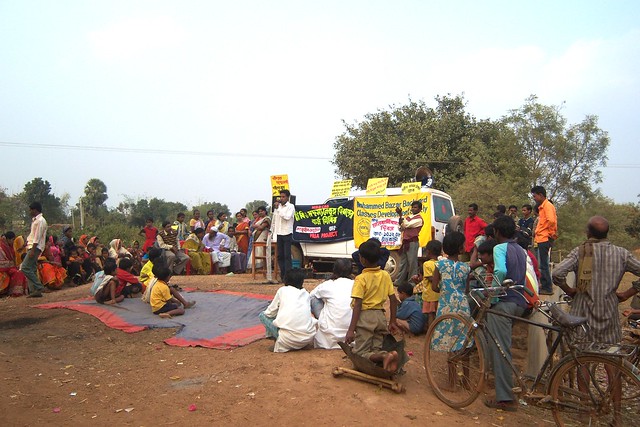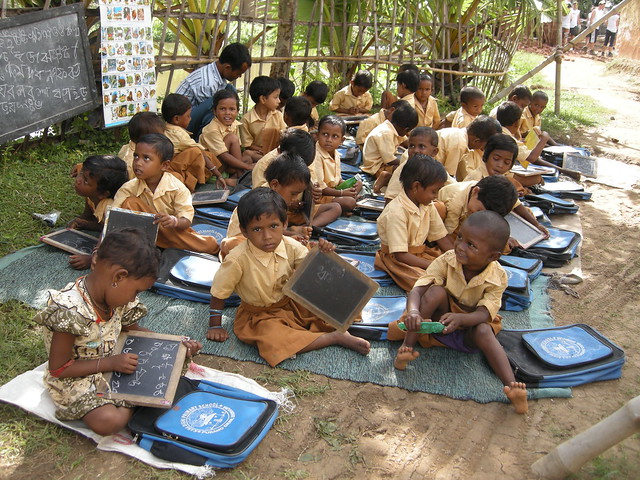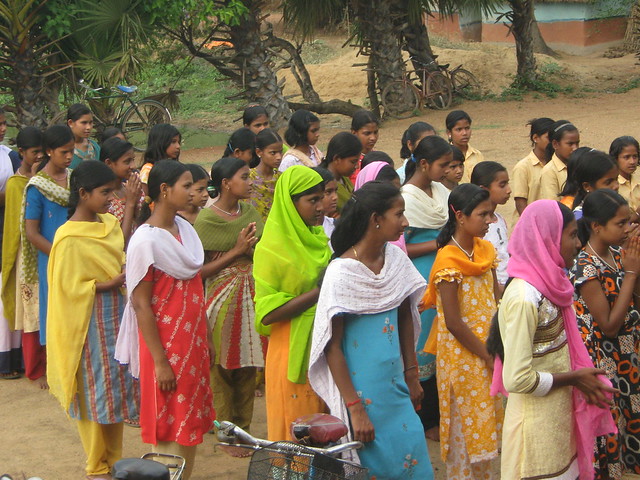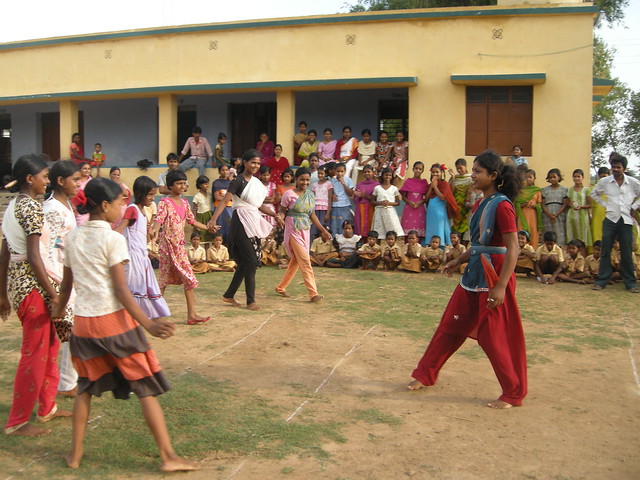By Zaidul Haque, TwoCircles.net,
Kolkata: Socially disadvantaged marginal groups such as Adivasis (Tribals) and Muslims living in the remote district of Birbhum of West Bengal are being severely neglected in terms of educational development as well as economic and political empowerment. Abject poverty has reduced them to the level of the most backward people of society. Not only are they unaware of the benefits of education, social awareness and self-employment, but they also lack in the basic issue of feminine hygiene.
Although the problems of the Tribals and Muslims are different because of their different cultural context, it is clear that at the grassroots level, both communities require serious efforts at social upliftment if they are to compete with the rest of society. To this effect, a team of passionately devoted women has taken it upon itself to create awareness of empowerment and the need for self-reliance among the tribal and Muslim women of these areas.

An awareness programme of MBBDS at Purana Gram Panchayet Area
The Mohammad-Bazar Backward Classed Development Society of Birbhum District of West Bengal (MBBDS), targets people from the marginally weaker sections of society, mainly the Tribals and Muslims women. The society is both headed and managed entirely by women. Speaking to TwoCircles.net, Ayesha Khatun, head of MBBDS confirmed that the Secretary and President are both Muslim while the rest of the six members comprise four Muslim and two Adivasi women.
In the remote villages of Birbhum, Muslim women groups run schools, training programs, health and hygiene awareness, HIV prevention programs and promote Self-Help groups.
The main areas of operation of MBBDS are concentrated in Purana, Bharkatta, Sekada gram panchayets in Birbhum and Shikaripara in Jharkhand. They are also active in projects for Muslim girls’ education in Murshidabad and Howrah districts. They have been running the Kanadighi Prathyahik Bidyalaya, a school, under the Purana Gram Panchayet in Birbhum since 2003. More than 250 students who were dropouts are getting education there. Another school, Jambani Cluster Child Growth Centre for Tribals under the Deucha Grampanchayet, has enrolled 78 students up to now.

A school for Tribals at Jambani by MBBDS
MBBDS also supports a school along the Ganges River bank, an area affected by land erosion. As a result of the land erosion, people are losing their homes and living in very poor and inhumane conditions. Their main occupation is bidi making. Ayesha Khatoon sees education as the way forward, and so has established a school in Akheriganj which has 71 students at present. Another school is being run in Panchpara, Sultanpur of Howrah district near Kolkata.
Panchpura of Howrah district is a Muslim dominated area. According to research conducted by the MBBDS, most of the residents are refugees of the Bhagalpur riots. Since it is a low-lying area, it is easily flooded during the rainy season and so the school dropout rate was very high as children were unable to go to school. Also, there is no electricity or a road network connecting the area to major cities. So, the MBBDS has provided a school for basic education to the poor Muslims.

Muslim girls at an education camp
Though they belong to the Hindu community `Adivasis’ are locally called `Santhal’. Their culture and lifestyle is vastly different from that of Muslims, and they even speak their own language, ‘Santhali’. The Birhum district is mainly dominated by the Tribals but there are a few Muslim pockets too.
The MBBDS has taken some initiatives which may help both communities:
• Provision of Elementary schools for Adivasi children in the area
• Health awareness: diarrhea and malaria prevention programs
• Built a nutritional garden
• Vocational training: tailoring and stitching; making of low-cost sanitary napkins; `Kantha Stitch’ (traditional hand embroidery particular to Bengal); hand batiks.
• A Pond for fish reproduction
• Training programs to develop leadership abilities in women
• Sports training (volley ball, khokho, kabadi)
• Provision of adult education to teenage girls
• HIV/AIDS Awareness Programs
• Awareness and Prevention of child marriages
The MBBDS has opened up a school which provides free study materials, free coaching, free uniforms, and even free food. There have been generous donations from internationally renowned organizations such as Association for India’s Development (AID), Hope Foundation, American Jewish World Service (AJWS), Dining for Women (DFW), PRIYA, to name a few.
The grinding poverty in these remote areas has forced the people to work as menial laborers earning daily wages while their women earn a living as sex workers. As these areas are located along the National Highway, truck drivers stop by to rest and find willing partners, for a small price. Hence, the risk of HIV/AIDS is very high. In order to combat this deadly trend, Ayesha Khatun has created an awareness program highlighting the dangers of unprotected sex.

Mumtaz Khatun, student of Rokeya Mission is a national-level Kabaddi player
There is also one pre-primary school in the area which encompasses at least 6-7 villages including Heruka, Sahanagar, and Kaldighi. Ayesha Khatun hopes that education will pave the way for these under-privileged communities to interact and assimilate with society and building schools is the first step in this direction.
Ayesha Khatun’s Society bought nearly an acre of land and built a school from the Fifth standard to Secondary Level. The Rokeya Mission School in Puranagram Muslimpara (Mohammadbazar area) has 109 students enrolled to date. The school provides leadership and self-help group training, family life education and counseling besides the other facilities named above. Mumtaz Khatun, a student of Rokeya Mission School has been selected to be a member of the National Kabadi Team: a real achievement indeed.
Ayesha Khatun, the inspiration behind this noble mission comes from an educated and elite background. She has seven other siblings: five brothers and two sisters who all hold Postgraduate degrees. She has a double Masters degree herself. Her father, Mohammad Minhilal was a school teacher. Ayesha Khatun was very impressed with the teachings of the Quran and the life of the Holy Prophet in her teenage years. She believes that Islam gives women equal rights and that the Quran should be followed and implemented correctly. It was after reading the Quran and its interpretation that Ayesha ventured to do social service.
Ayesha Khatun strongly believes in the social upliftment and political empowerment of women. The three-tiered Panchayet system already has a 50% reservation for women. She thinks that if women took the initiative and availed the opportunity to take part in politics, society and especially Muslim women would greatly benefit from this.
Besides being a social worker, Ayesha Khatun is also a writer. She has won the Rokeya Award from Bharatiya Bhasha Parishad, Young Writers Award from Bharatiya Sahitya Academy and Ila Chand Award from Bangiya Sahitya Parishad.
Edited by Ozma Siddiqui
Slide show:

